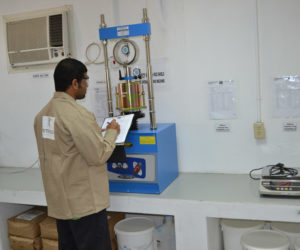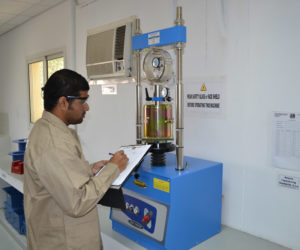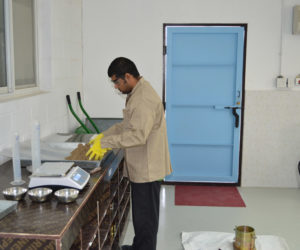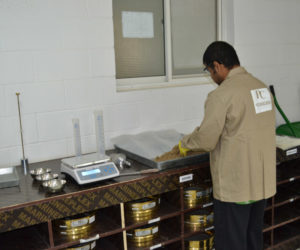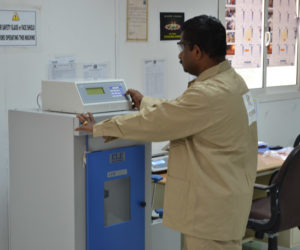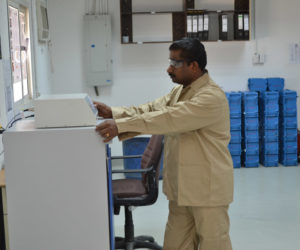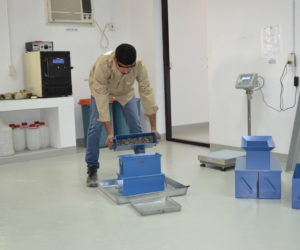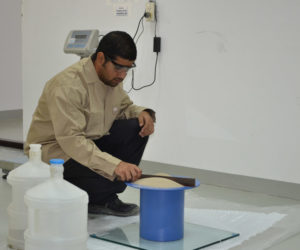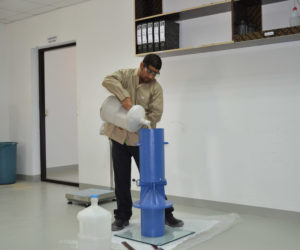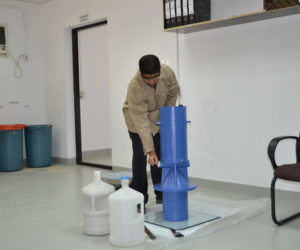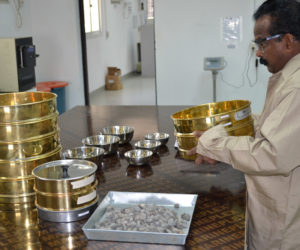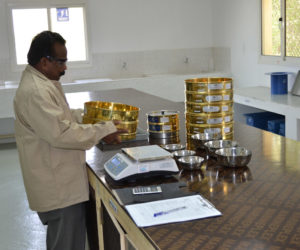Civil Material Testing
FIELD SAMPLING
This includes taking samples of aggregate from stock piles, of fresh concrete, tack coat and hot asphalt, soils and building blocks. Cores are cut from asphalt for routine QC, while from concrete for determinations of strength or chloride, sulphate and carbonations. Other construction materials include concrete mixing water and pavers.
FIELD TESTING
Typical tests include the electrical and thermal resistively of soils and field density by either sand replacement or nuclear densitometry; site CBR, plate load test. Properties of fresh concrete usually determined are slump, temperature, air content and density.
LABORATORY TESTS
Measurement of density and compressive strength of cylinders and cubes and the grading of aggregate are routinely carried out. Other concrete advance tests include core evaluation (e.g. strength, density, chloride and sulphate contents, and carbon dioxide penetration) as well as rapid chloride permeability, water “impermeability” and volume of permeable pores, in addition to all these tests we are preparing the Mix design of Concrete in Many Grades for Concrete Plants around the Kingdom.
Asphalt samples are tested for composition, density and layer thickness, and verify the mix design for fresh asphalt Material.
Concrete
- Sampling of Fresh Concrete
- Temperature of Fresh Concrete
- Slump of Hydraulic-Cement Concrete
- Density of Concrete (Gravimetric Method).
- Air Content of Fresh Concrete by Pressure Method
- Setting Time of Fresh Concrete
- Making and Curing of Concrete in Field
- Making and Curing of Concrete in Lab
- Compressive Strength of Concrete Cylinder
- Compressive Strength of Hydraulic-Cement Mortar
- Compressive Strength of Chemical-Resistant Mortars, Grouts, Monolith Surfacing, And Polymer Concretes
- Obtaining and Testing Drilled Cores and Sawed Beams Of Concrete
- Sampling and Testing Grout for Masonry
- Rebound Number of Hardened Concrete
- Flow of Hydraulic Cement Mortar
- Slump of Fresh Concrete by Flow Table
- Determining Density of Structural Lightweight Concrete
- Compressive Strength of Concrete Cube
- Capping Cylindrical Concrete Specimens1
- Unbonded Caps in Determination of Compressive Strength of Hardened Cylindrical Concrete Specimens.
- Moisture Condition of Concrete by Moisture meter.
Soil
- Sieve Analysis of Soil
- Particles Size-Distribution of Fine-Grained Soils using the Sedimentation (Hydrometer Method)
- Standard Compaction Test (Proctor)
- Modified Compaction Test (Proctor)
- California Bearing Ratio
- Moisture Content of Soil
- Liquid, Plastic Limit, Plasticity Index Test
- Sand Equivalent
- Density of Soil by Sand Cone Method
- Density of Soil by Nuclear Method
- Density of Soil by Electrical Method
- Material Finer Than Sieve No.200
- Classification of Soil using USCS
Aggregate
- Sampling of Aggregate
- Reducing Sample of Aggregate
- Sieve Analysis of Aggregate
- Material Finer Than Sieve No.200
- Flakiness, Elongation Test
- Light Weight Aggregate
- Bulk Density & Void of Aggregate
- Organic Impurities of Aggregate
- Soundness Test of Aggregate
- Clay Lumps and Friable Particles of Aggregate
- Specific Gravity of Coarse Aggregate
- Specific Gravity of Fine Aggregate
- Abrasion of Small Size Aggregate Using Los Angeles Machine
- Abrasion of Large Size Aggregate Using Los Angeles Machine
Asphalt
- Sampling of Bituminous Material
- Quantitative Extraction of Bitumen from Bituminous Paving Mixture
- Mechanical Sieve Analysis of Extracted Aggregate
- “Theoretical Maximum Specific Gravity and Density of Bituminous Paving Mixtures
- Preparation of Bituminous Specimen Using Marshall Apparatus
- Marshall Stability and Flow of Bituminous Mixtures
- Thickness or Height of Compacted Bituminous Paving Mixture Specimens
- Specific Gravity of Non-Absorptive Compacted Bitumen Mixtures
- Density of Bituminous by Nuclear Method
- Application of Rate of bituminous Distributors
Coating
- Dry Film Thickness by Ultra Sonic Gauge
- Pull-Off Strength of Coating

